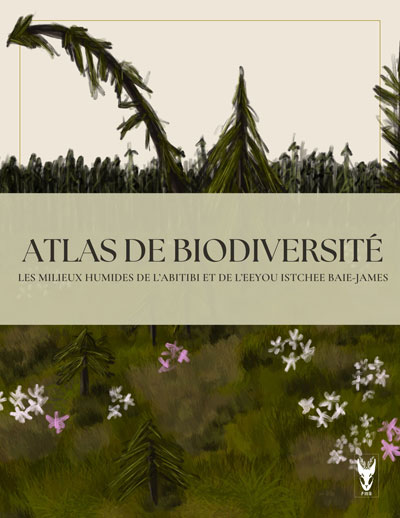
Isabelle Laforest-Lapointe
Membre régulière
Impact des interactions plante-microorganismes de la phyllosphère sur les fonctions des écosystèmes terrestres
Professeure adjointe
Université de Sherbrooke
Faculté des Sciences
Département de biologie
2500, boul. de l'Université
Sherbrooke (Québec) Canada, J1K 2R1
(819) 821-8000 Poste 63473
Page départementale ![]() | Laforest-Lapointe Lab
| Laforest-Lapointe Lab ![]() | Site personnel
| Site personnel ![]() | Twitter
| Twitter ![]() | ResearchGate
| ResearchGate ![]() | LinkedIn
| LinkedIn ![]() | Google Scholar
| Google Scholar ![]()
Formation | CRC | Publications
FORMATION
- Post-Doctoral Research Position - Departments of Physiology and Pharmacology & Pediatrics, Cumming School of Medicine, University of Calgary (2017 - 2019) - Directrice: Marie-Claire Arrieta

- Ph.D Biology - Université du Québec à Montréal (2012 - 2017) - Directeur: Steven Kembel
 - Co-Directeur: Christian Messier
- Co-Directeur: Christian Messier 
- M.Sc Statistics & Operations Research
 - Universitat Politecnica de Catalunya (2011 - 2012)
- Universitat Politecnica de Catalunya (2011 - 2012)
- M.Sc Terrestrial Ecology & Biodiversity Management - Universitat Autonoma de Barcelona (2011) - Directeur: Javier Retana
 - Co-Directeur: Jordi Martinez-Vilalta
- Co-Directeur: Jordi Martinez-Vilalta 
- B.Sc Biology (Environment & Conservation) - Université Laval (2010)
BIOGRAPHIE
J'ai obtenu un poste de professeure adjointe à l'Université de Sherbrooke en janvier 2020. J'ai complété mon doctorat à l'Université du Québec à Montréal (laboratoire Kembel, 2012-2017) ainsi qu'un poste de chercheure postdoctorale à l'University de Calgary (laboratoire Arrieta, 2017-2019). J'ai également complété une MSc en écologie terrestre et gestion de la biodiversité à l'Universitat Autonoma de Barcelona (2011) ainsi que les cours d'une MSc en statistiques à l'Universitat Politecnica de Catalunya (2012). En tant que spécialiste de l'écologie microbienne, mon équipe utilise l'écologie, la microbiologie, la bioinformatique, les statistiques et la génomique pour étudier les interactions hôte-microbe dans les plantes et les écosystèmes humains. La recherche, la vulgarisation et l'enseignement sont mes plus grandes passions.
I am an Assistant Professor at Université de Sherbrooke since January 2020. As an early career researcher, I hold a Canada Research Chair Tier II in Applied Microbial Ecology, as well as New Frontiers: Exploration, NSERC Discovery, and FRQNT-Relève grants. I completed my PhD at the Université du Québec à Montréal (Kembel Lab, 2012-2017) and a Postdoctoral Fellowship at the University of Calgary (Arrieta Lab, 2017-2019). I had the privilege of completing a MSc in Terrestrial Ecology and Biodiversity Management at the Universitat Autonoma de Barcelona (2011) and the courses of a Master in Statistics at the Universitat Politecnica de Catalunya (2012). As microbial ecologists, our team uses ecology, microbiology, bioinformatics, statistics, and genomics to study host-microbe interactions in plants and human ecosystems.
THÈMES DE RECHERCHE
Titulaire de la Chaire de recherche du Canada en écologie microbienne appliquée
Chaire de Recherche du Canada Niveau 2 / Canada Research Chair Tier 2

L'écologie microbienne, une synergie entre la microbiologie, l'écologie et la bioinformatique, a révélé un rôle important des interactions hôte-microorganismes en tant que moteurs des fonctions des écosystèmes terrestres telles que la productivité et la résilience. L'objectif de ma CRC est d'explorer les interactions hôte-microbes multi-trophiques dans un contexte de (1) variation temporelle de la structure taxonomique et fonctionnelle des communautés microbiennes ; (2) augmentation des stress abiotiques dus au changement global ; et (3) développement de technologies de bio-contrôle microbien (communautés synthétiques) comme alternative aux produits chimiques. Cette CRC en écologie microbienne appliquée permettra à la fois d'élargir notre compréhension mécanistique des symbioses plantes-microbes et d'améliorer les technologies visant à maintenir la productivité et la résilience des écosystèmes terrestres.
Microbial ecology, a synergy between microbiology, ecology, and bioinformatics, has revealed an important role for host-microbe interactions as drivers of terrestrial ecosystem functions such as productivity and resilience. The objective of the CRC is to explore multi-domain host-microbe interactions in a context of (1) temporal variation of taxonomic and functional microbial community structure; (2) increasing abiotic stresses due to global change; and (3) development of microbial bio-control technologies (synthetic communities) as an alternative to chemicals. The CRC in Applied Microbial Ecology will both expand our mechanistic understanding of plant- microbe symbioses and improve technologies aimed at maintaining ecosystem productivity and resilience.
PRIX ET DISTINCTIONS
- 2021/11 - Prix Gisèle-Lamoureux du FRQNT | Publication primée : Un rôle de taille pour les microorganismes. Publiée dans : Le Climatoscope
- 2021/05 - Early Career Award, Canadian Society of Ecology and Evolution
- 2018/12 - Best post-doctoral presentation, Snyder Institute
- 2018/01 - Top 10 Scientific Discoveries from Quebec of 2017, Quebec Science
- 2017/05 - PhD Diversity and Excellence in Research Award, Canadian Society of Ecology and Evolution
- 2017/04 - Research Award for best student publication, Université du Québec à Montréal
- 2015/07 - ISME Best Contribution, 5th Phyllosphere International Symposia, International Society of Microbial Ecology
CHRONIQUEUSE SCIENTIFIQUE POUR L'ÉMISSION MOTEUR DE RECHERCHE À RADIO-CANADA
- audio fil du 16 août 2023 : Quelle maladie provoque les taches noires sur les feuilles d'érable?

- audio fil du 11 mai 2020 : Quels sont les effets bénéfiques et négatifs du microbiote de la phyllosphère?

Vous pouvez télécharger toutes mes références bibliographiques en format BibTeX, BibTeX-CSV, FRQNT ou EndNote
PUBLICATIONS
Livres
Aucun
Chapitres de livre
Aucun
Livres, numéros spéciaux et actes de colloques publiés à titre d'éditeur
Aucun
Articles révisés par un comité de lecture
- Chamard, J., Faticov, M., Blanchet, F.G., Chagnon, P.-L., Laforest-Lapointe, I. (2024) Interplay of biotic and abiotic factors shapes tree seedling growth and root-associated microbial communities. Communications Biology, 7(1):360
- Mercer, E.M., Ramay, H.R., Moossavi, S., Laforest-Lapointe, I., Reyna, M.E., Becker, A.B., Simons, E., Mandhane, P.J., Turvey, S.E., Moraes, T.J. et al. (2024) Divergent maturational patterns of the infant bacterial and fungal gut microbiome in the first year of life are associated with inter-kingdom community dynamics and infant nutrition. Microbiome, 12(1)
- Chowdhury, M.R., Hone, K.G.M.S., Prevost, K., Balthazar, P., Avino, M., Arguin, M., Beaudoin, J., Malick, M., Desgagne, M., Robert, G. et al. (2024) Optimizing Fecal Occult Blood Test (FOBT) Colorectal Cancer Screening Using Gut Bacteriome as a Biomarker. Clinical Colorectal Cancer, 23(1):22 – 34.e2
- Mahdavi, M., Prevost, K., Balthazar, P., Hus, I.F.-P., Duchesne, E., Dumont, N., Gagne-Ouellet, V., Gagnon, C., Laforest-Lapointe, I., Masse, E. (2024) Disturbance of the human gut microbiota in patients with Myotonic Dystrophy type 1. Computational and Structural Biotechnology Journal, 23:2097 – 2108
- Ishak, S., Rondeau-Leclaire, J., Faticov, M., Roy, S., Laforest-Lapointe, I. (2024) Boreal moss-microbe interactions are revealed through metagenome assembly of novel bacterial species. Scientific Reports, 14(1):22168
- Lajeunesse, G., Roussin-Leveillee, C., Boutin, S., Fortin, E., Laforest-Lapointe, I., Moffett, P. (2023) Light prevents pathogen-induced aqueous microenvironments via potentiation of salicylic acid signaling. Nature Communications, 14(1):713
- Poursalavati, A., Javaran, V.J., Laforest-Lapointe, I., Fall, M.L. (2023) Soil Metatranscriptomics: An Improved RNA Extraction Method Toward Functional Analysis Using Nanopore Direct RNA Sequencing. Phytobiomes Journal, 7(1):42 – 54
- Gutierrez, M.W., Mercer, E.M., Moossavi, S., Laforest-Lapointe, I., Reyna, M.E., Becker, A.B., Simons, E., Mandhane, P.J., Turvey, S.E., Moraes, T.J. et al. (2023) Maturational patterns of the infant gut mycobiome are associated with early-life body mass index. Cell Reports Medicine, 4(2)
- Perreault, R., Laforest-Lapointe, I. (2022) Plant-microbe interactions in the phyllosphere: facing challenges of the anthropocene. ISME Journal, 16(2):339-345
- De Bellis, T., Laforest-Lapointe, I., Solarik, K.A., Gravel, D., Kembel, S.W. (2022) Regional variation drives differences in microbial communities associated with sugar maple across a latitudinal range. Ecology, 103(8)
- Renaudin, M., Laforest-Lapointe, I., Bellenger, J.-P. (2022) Unraveling global and diazotrophic bacteriomes of boreal forest floor feather mosses and their environmental drivers at the ecosystem and at the plant scale in North America. Science of the Total Environment, 837
- Laforest-Lapointe, I., Becker, A.B., Mandhane, P.J., Turvey, S.E., Moraes, T.J., Sears, M.R., Subbarao, P., Sycuro, L.K., Azad, M.B., Arrieta, M.-C. (2021) Maternal consumption of artificially sweetened beverages during pregnancy is associated with infant gut microbiota and metabolic modifications and increased infant body mass index. Gut Microbes, 13(1):1-15
- Klancic, T., Laforest-Lapointe, I., Wong, J., Choo, A., Nettleton, J.E., Chleilat, F., Arrieta, M.-C., Reimer, R.A. (2021) Concurrent prebiotic intake reverses insulin resistance induced by early-life pulsed antibiotic in rats. Biomedicines, 9(1):1-24
- Mahdavi, M., Laforest-Lapointe, I., Masse, E. (2021) Preventing colorectal cancer through prebiotics. Microorganisms, 9(6)
- Partida-Rodriguez, O., Nieves-Ramirez, M., Laforest-Lapointe, I., Brown, E.M., Parfrey, L., Valadez-Salazar, A., Thorson, L., Moran, P., Gonzalez, E., Rascon, E. et al. (2021) Exposure to Parasitic Protists and Helminths Changes the Intestinal Community Structure of Bacterial Communities in a Cohort of Mother-Child Binomials from a Semirural Setting in. mSphere, 6(4):1-19
- Klancic, T., Laforest-Lapointe, I., Choo, A., Nettleton, J.E., Chleilat, F., Noye Tuplin, E.W., Alukic, E., Cho, N.A., Nicolucci, A.C., Arrieta, M.-C. et al. (2020) Prebiotic Oligofructose Prevents Antibiotic-Induced Obesity Risk and Improves Metabolic and Gut Microbiota Profiles in Rat Dams and Offspring. Molecular Nutrition & Food Research, 64(16)
- van Tilburg Bernardes, E., Pettersen, V.K., Gutierrez, M.W., Laforest-Lapointe, I., Jendzjowsky, N.G., Cavin, J.-B., Vicentini, F.A., Keenan, C.M., Ramay, H.R., Samara, J. et al. (2020) Intestinal fungi are causally implicated in microbiome assembly and immune development in mice. Nature Communications, 11(1)
- Heirali, A., Thornton, C., Acosta, N., Somayaji, R., Laforest-Lapointe, I., Storey, D., Rabin, H., Waddell, B., Rossi, L., Arrieta, M.C. et al. (2020) Sputum microbiota in adults with CF associates with response to inhaled tobramycin. Thorax, 75(12):1058-1064
- Laforest-Lapointe, I., Whitaker, B.K. (2019) Decrypting the phyllosphere microbiota: progress and challenges. American Journal of Botany, 106(2):171-173
- Heirali, A.A., Acosta, N., Storey, D.G., Workentine, M.L., Somayaji, R., Laforest-Lapointe, I., Leung, W., Quon, B.S., Berthiaume, Y., Rabin, H.R. et al. (2019) The effects of cycled inhaled aztreonam on the cystic fibrosis (CF) lung microbiome. Journal of Cystic Fibrosis, 18(6):829-837
- Wallace, J., Laforest-Lapointe, I., Kembel, S.W. (2018) Variation in the leaf and root microbiome of sugar maple (Acer saccharum) at an elevational range limit. PeerJ, 2018(8)
- Ruiz-González, C., Archambault, E., Laforest-Lapointe, I., Del Giorgio, P.A., Kembel, S.W., Messier, C., Nock, C.A., Beisner, B.E. (2018) Soils associated to different tree communities do not elicit predictable responses in lake bacterial community structure and function. FEMS Microbiology Ecology, 94(8)
- Laforest-Lapointe, I., Arrietaa, M.-C. (2018) Microbial eukaryotes: A missing link in gut microbiome studies. mSystems, 3(2)
- Ximenez-Garcia, C., Finlay, B.B., Nieves-Ramirez, M.E., Partida-Rodriguez, O., Laforest-Lapointe, I., Reynolds, L.A., Brown, E.M., Valdez-Salazar, A., Moran-Silva, P., Rojas-Velazquez, L. et al. (2018) Asymptomatic intestinal colonization with protist Blastocystis is strongly associated with distinct microbiome ecological patterns. mSystems, 3(3)
- St-Denis, A., Kneeshaw, D.D., Belanger, N., Simard, S., Laforest-Lapointe, I., Messier, C. (2017) Species-specific responses to forest soil inoculum in planted trees in an abandoned agricultural field. Applied Soil Ecology, 112:1-10
- Laforest-Lapointe, I., Messier, C., Kembel, S.W. (2017) Tree leaf bacterial community structure and diversity differ along a gradient of urban intensity. mSystems, 2(6)
- Laforest-Lapointe, I., Paquette, A., Messier, C., Kembel, S.W. (2017) Leaf bacterial diversity mediates plant diversity and ecosystem function relationships. Nature, 546(7656):145-147
- Laforest-Lapointe, I., Arrieta, M.-C. (2017) Patterns of early-life gut microbial colonization during human immune development: An ecological perspective. Frontiers in Immunology, 8(JUL)
- Laforest-Lapointe, I., Messier, C., Kembel, S.W. (2016) Host species identity, site and time drive temperate tree phyllosphere bacterial community structure. Microbiome, 4
- Laforest-Lapointe, I., Messier, C., Kembel, S.W. (2016) Tree phyllosphere bacterial communities: Exploring the magnitude of intra- and inter-individual variation among host species. PeerJ, 2016(8)
- Wallace, J., Aquilue, N., Archambault, C., Carpentier, S., Francoeur, X., Greffard, M.-H., Laforest-Lapointe, I., Galicia, L., Messier, C. (2015) Present forest management structures and policies in temperate forests of Mexico: Challenges and prospects for unique tree species assemblages. Forestry Chronicle, 91(3):306-317
- Laforest-Lapointe, I., Martinez-Vilalta, J., Retana, J. (2014) Intraspecific variability in functional traits matters: Case study of Scots pine. Oecologia, 175(4):1337-1348
Articles publiés dans des actes de colloque (proceedings)
Aucun
Rapports scientifiques, manuels et autres
Aucun
Thèses, mémoires et essais
- Laforest-Lapointe, I. (2017) Exploring the temperate tree leaf microbiome : from natural forests to controlled experiments and urban environments. Thèse de doctorat, UQAM
Thèses, mémoires et essais supervisés
Aucun
Articles non révisés par un comité de lecture
- Frayssee, J., Tardif, S., Fernandez, M., Alard, D., Benot, M.-L., Carassou, L., Castagneyrol, B., Ferrandiz-Rovira, M., Paquette, A., Laforest-Lapointe, I. (2023) Biodiversité urbaine : Portraits de Montréal, Bordeaux et Barcelone. Le Climatoscope (5):54-59
- Lajeunesse, G., Laforest-Lapointe, I. (2023) Les changements climatiques : Mise en place d’un environnement optimal pour ravager nos cultures. Le Climatoscope (5):42-45










